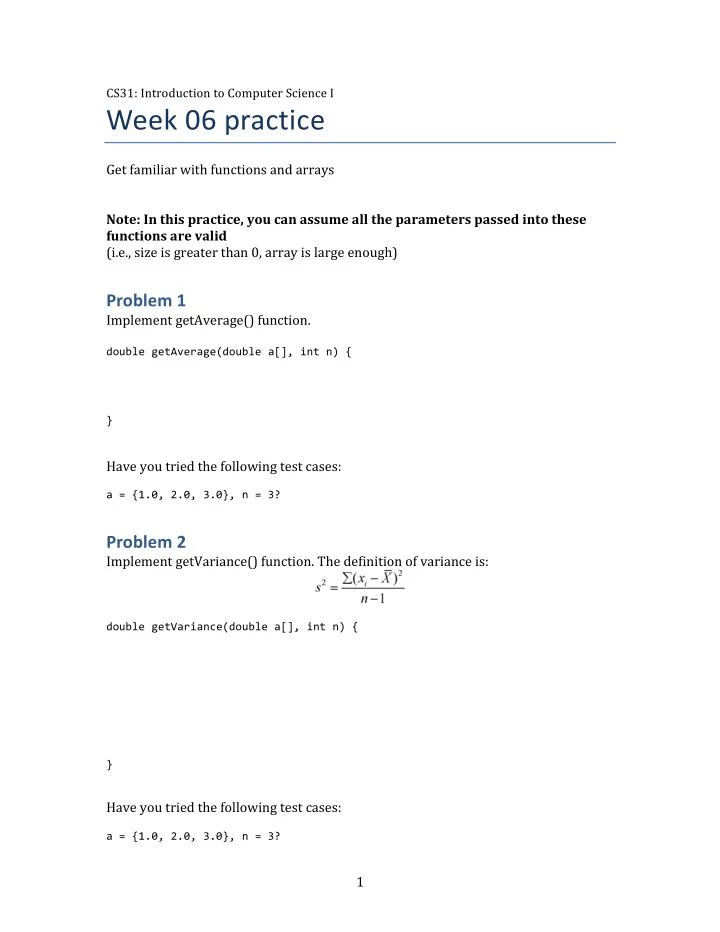

CS31: Introduction to Computer Science I Week 06 practice Get familiar with functions and arrays Note: In this practice, you can assume all the parameters passed into these functions are valid (i.e., size is greater than 0, array is large enough) Problem 1 Implement getAverage() function. double getAverage(double a[], int n) { } Have you tried the following test cases: a = {1.0, 2.0, 3.0}, n = 3? Problem 2 Implement getVariance() function. The definition of variance is: double getVariance(double a[], int n) { } Have you tried the following test cases: a = {1.0, 2.0, 3.0}, n = 3? 1
Problem 3 Implement countNumNegativeNumbers() function, which returns the amount of negative numbers in an array. int countNumNegativeNumbers(int a[], int n) { } Have you tried the following test cases: a = {5, 2, -1, 6, 3, -7, -4}, n = 7? a = {0}, n = 1? Problem 4 Implement getMinValue() function, which returns the minimum value in the array int getMinValue(int a[], int n) { } Have you tried the following test cases: a = {1, 2, 3, 4}, n = 4? a = {4, 3, 2, 1}, n = 4? a = {2, 5, 9, 1, 3}, n = 5? Problem 5 Implement getGreatCommonDivisor() function. Note that the parameters a and b are guaranteed to be positive. int getGreatCommonDivisor(int a, int b) { } 2
Have you tried the following test cases: a = 25, b = 100? a = 18, b = 48? a = 1, b = 1? Problem 6 Implement getGreatCommonDivisorV2() function. The difference is that you are going to get an array of integers instead of just 2 numbers. int getGreatCommonDivisorV2(int a[], int n) { } Have you tried the following test cases: a = {25, 50, 100}, n = 3? a = {48, 18, 54, 66}, n = 4? a = {10, 10}, n = 2? a = {1000}, n = 1? Problem 7 Implement isArrayNonDecreasing() function. bool isArrayNonDecreasing(int a[], int n) { } 3
Have you tried the following test cases: a = {20, 30, 40}, n = 3? a = {40, 30, 20, 10}, n = 4? a = {23, 59, 42}, n = 3? a = {10, 10, 10}, n = 3? a = {1000}, n = 1? Problem 8 Implement isSubArray() function to test if a2 is a subarray of a1. X is a subarray of Y if a (contiguous) segment of array Y is identical to array X. bool isSubArray(int a1[], int n1, int a2[], int n2) { } Have you tried the following test cases: a1 = {20, 30, 40}, n1 = 3, a2 = {20, 40}, n2 = 2? a1 = {20, 30, 40}, n1 = 3, a2 = {20, 30}, n2 = 2? a1 = {20, 30}, n1 = 2, a2 = {20, 30, 40}, n2 = 3? a1 = {20, 30, 40}, n1 = 3, a2 = {40, 30, 20}, n2 = 3? a1 = {20, 30, 40}, n1 = 3, a2 = {20}, n2 = 1? Problem 9 Implement isSubSequence() function to test if a2 is a subsequence of a1. X is a subsequence of Y if we delete some elements from array Y, without changing the order of the remaining values, are identical to X. 4
bool isSubSequence(int a1[], int n1, int a2[], int n2) { } Have you tried the following test cases: a1 = {20, 30, 40}, n1 = 3, a2 = {20, 40}, n2 = 2? a1 = {20, 30, 40}, n1 = 3, a2 = {20, 30}, n2 = 2? a1 = {20, 30}, n1 = 2, a2 = {20, 30, 40}, n2 = 3? a1 = {20, 30, 40}, n1 = 3, a2 = {40, 30, 20}, n2 = 3? a1 = {20, 9, 30, 40, 8}, n1 = 5, a2 = {20, 30, 40}, n2 = 3? a1 = {20, 30, 40}, n1 = 3, a2 = {20}, n2 = 1? 5
Problem 10 Implement sort() function to rearrange elements in the array in a non-decreasing order. void sort(int a[], int n) { } Have you tried the following test cases: a = {20, 30, 40}, n = 3? a = {40, 30, 20}, n = 3? a = {20, 40, 30}, n = 3? a = {1, 9, 2, 8, 3, 7, 4, 6, 5}, n = 9? a = {1000}, n = 1? 6
Recommend
More recommend